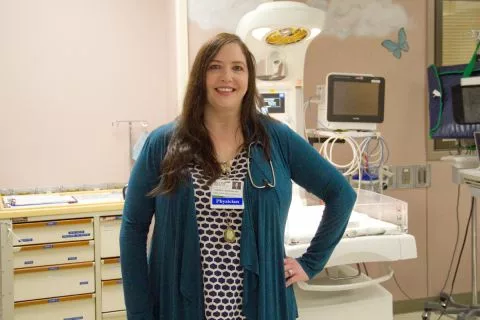For babies suffering neonatal abstinence syndrome, or NAS, those first hours and days can be brutal as they go through withdrawal: tremors and seizures, twitching, fussiness.
“It’s as though their nervous system is in overdrive,” said Dr. Chasity Caperton, pediatrician and regional medical director of primary care at OSF St. Francis Hospital and Medical Group in Escanaba.
Withdrawal sometimes doesn’t show up until Day 3 or 4, she said, so Moms agree to stay in the hospital for at least five days. The Upper Peninsula hospital used some of the funds to pay for sleeper-sofas and responsive bassinets that vibrate to soothe a fussy baby.
It also paid for training for staff to fight the stigma sometimes associated with patients with addiction or in recovery, Caperton said.
The resulting rooming-in will benefit more than moms and babies; the effort can help save health-care dollars — both immediately and in the long run, Caperton and others say.
Shorter stays, numerous benefits
Research shows that babies that room-in with Mom have shorter hospital stays. For example, prior to rooming-in, the average length of stay for infants born substance-exposed at Munson Health System was 7.84 days; the average length of stay from July 2023 to March 2024 was 3.48 days, according to the state health department.
Among other benefits of rooming in, according to the evidence:
- Oxytocin, the hormone that triggers contractions, also stimulates “mothering” feelings. Endorphins enhance a mother’s responsive nature, boosting the temperature of her breasts to keep the newborn warm. Baby, meanwhile, is under a post-birth “adrenaline rush” and will be ready to nurse soon after birth.
- Baby is exposed to bacteria on the mother’s skin during skin-to-skin, which may help her fight illness from harmful germs.
- Moms more quickly recognize and respond to their babies’ needs.
- Baby’s body functions — breastfeeding, breathing, stabilizing blood sugar levels — are improved in skin-to-skin contact. They may sleep easier and gain more weight each day.
Long-term, research suggests that rates of child abuse, neglect, and abandonment are lower for mothers who have frequent and extended contact with their newborns during the early postpartum period. That’s because caring relationships can help babies build a resilience that can last a lifetime.
“We’re talking about preventing the intergenerational trauma of substance abuse disorder, ” Bagdasarian said.
Privacy, comfort
At Bronson Battle Creek Hospital, about $70,000 went into technology, allowing babies to stay with their moms, said Carol Fuller, Bronson’s director of women’s and children’s services. The new technology allows staff at a nursing station to observe vital signs remotely — while Baby remains with Mom instead of a nursery where parents and staff “are coming and going. It’s not private, it’s not comfortable,” she said.
Additionally, renovated rooms have comfortable rockers and sound machines that offer white noise to help keep Mom and Baby comfortable, she said.

